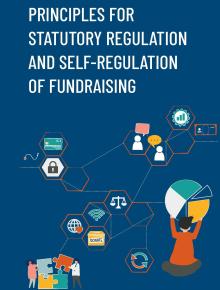Funding and Philanthropy
Access to resources is a cornerstone for CSOs to achieve their mission and serve communities. Nevertheless, financial sustainability is the primary challenge for CSOs worldwide. Sustainability can only be achieved if CSOs have access to diverse resources. There are four main sources of revenue available to CSOs:
- government funding (central and local level);
- income generating activities: fees for services, sales, membership fees, rents, investments, business ventures;
- domestic philanthropy (financial donations and in-kind support from volunteers); and
- funding from abroad (foreign funding, or cross-border funding).
The relative importance of all four sources varies among countries and regions and not one approach to strengthen one source independently will alleviate the sustainability problem.
Digital technologies in fundraising: New technologies provide innovative and cost-effective means to raise funds for important social missions. Fundraisers use Artificial Intelligence (AI) and algorithm-based systems to launch global campaigns. The private sector is playing an increasing role in fundraising and the societal environment is rapidly changing, too. At the same time, the rise of the digital also raises multiple questions:
How can CSOs and fundraisers keep up and utilize these new technologies? Do country laws and practices allow them to benefit from these new opportunities and protect from the potential risks they pose? What are the responsibilities of new intermediaries? Are there international and regional standards in place to safeguard the freedom of association and privacy? How can civil society capitalize on the proliferation of digital tools during the pandemic?
Despite the rapid spread of digital fundraising there is limited knowledge on these topics, particularly for legislators. With our research we seek to map out existing trends to help CSOs, fundraisers and policymakers to think through how the environment can be further improved for digital fundraising in their countries.
ECNL launched a flagship project to unpack approaches and legal frameworks that facilitate or restrict fundraising practices. As part of this we created knowledge base and produced guiding principles to support governments and CSOs to develop progressive legal frameworks that helps philanthropy and community fundraising to flourish.
- Overview of the Regulatory Framework for Fundraising in Europe is a comparative research with examples from 16 countries from all regions of Europe. The report was just a first step towards further research to assess the impact and implementation of legislation and self-regulation and launch a multi-stakeholder dialogue on how best to regulate or self-regulate fundraising.
- Principles for the Statutory Regulation and Self-regulation of Fundraising provide a global overview of current trends in fundraising regulation and self-regulation. They offer principles and recommendations addressing 7 key areas with the aim to support advocacy efforts to create an enabling environment for fundraising around the globe.
- Fundraising self-regulation An Analysis and Review: the study commissioned by ECNL to the Philanthropy Center, delves into the literature and practice of self-regulation regimes, with a focus on fundraising principles.
- Data Protection Standards for CSOs: the paper helps to identify how the right to privacy interacts with CSOs’ right to fundraise. It provides general guidance as to the application of data protection standards to CSOs’ fundraising initiatives.
- Digital technologies in fundraising and Good practices: We are also mapping out the opportunities as well as the risk of using digital technologies and AI for fundraising practices and how this manifests in the regulation. We delivered a session at FRO2020 online conference on this topic that was joined by 550 people from all over the world.
We support partners through creating knowledge base, designing standards and principles, empowering skills and strategies for reform. Where there is an emerging need or ongoing process of legislative reform or development of self-regulation, ECNL provides support to partners to assess the proposed regulation, facilitate dialogue and develop proposals to push back restrictions and advocate for an improved environment for access to resources.
Creating Knowledge base
ECNL monitors trends, documents legal responses and strategies by civil society, analysis developments and produces recommendations that support law reform. Highlight publications include:
Economic activities and entrepreneurship
- Comparative report on the legal framework for social economy and social enterprises: Comparative report on the distinctive features of the legal framework for social economy / social enterprises.
- Briefer on cutting edge trends in social entrepreneurship regulation: Highlight examples from 12 countries diverse in size and economic development.
- All You Need To Know About Entrepreneurial Activities of CSOs. Toolkit for Armenian CSOs.
Government funding
- Public funding for civil society organisations: Good practices in the European Union and Western Balkans.
- Handbook on Non-State Social Service Delivery Models: A guide for policy makers and practitioners in the post-Soviet region.
Philanthropy
- National policy responses for philanthropy and civil society across Europe in the context of COVID-19, ECNL contributed to Charities Aids Foundation briefer on European governments’ policy responses to supporting civil society and facilitating philanthropy and individual giving in the context of the coronavirus pandemic.
- Comparative analysis on the operating environment for public-benefit foundations in Western Balkans, by ECNL and European Foundation Center describes the developments in the legal environment of the foundation sector of the Western Balkans, sets recommendations for further law and policy reform.
Foreign funding
- Enabling the flow of donations. International standards that safeguard cross-border giving to CSOs: Countering restrictions to international funding and advocating for a more enabling environment for CSOs.
- Briefer on the international standards on access to foreign funding to CSOs.
- Analysis of Ukrainian draft laws related to access to foreign funding for CSOs (2020).
For other resources, see our publications.
Standards setting
The Fundraising Principles provide a global overview of current trends in fundraising regulation and self-regulation and offer principles and recommendations addressing 7 key areas.
Advocacy for reform
- Moldova: ECNL supported the development and implementation of the percentage designation mechanism that allows taxpayers to allocate 2% of their paid income tax to CSOs and religious organisations and provides additional income to hundreds of CSOs.
- Bulgaria: In July 2020 a group of MPs proposed restrictive amendments to the Bulgarian CSO law that stigmatize the organisations for receiving foreign funding. ECNL supported the Bulgarian Center for Not-for-Profit Law (BCNL) with the legal analysis and the preparation of arguments against the draft law.
- Armenia: ECNL supported Transparency International Anti-Corruption Center in Armenia (TIAC) to advocate for changes to the Regulation on state funding to CSOs to ensure that state funding is provided transparently and after a competition. Similarly, in Moldova ECNL works with IVC Moldova to create unified rules for state funding to CSOs. As a starting point, the new NCO Law (adopted in 2020) contains a list of principles for state funding to CSOs on which the regulation is based.
- Serbia: ECNL supports Trag Foundation and Catalyst Balkan to improve the legal environment of crowdfunding to ensure access to funding to smaller, rural communities and provide support to causes that are generally less visible in “traditional” philanthropy.
For other actions, see our news.
- EFA News on how EU member states use tax benefits to stimulate philanthropy.
- EFA News on the Opportunities & risks of using digital technologies in fundraising.
- How can EU law safeguard CSOs’ access to funding: a landmark decision.
- ESELA Interview with Senior Legal Advisor Eszter Hartay and Executive Director Katerina Hadzi-Miceva Evans on ECNL’s work on social enterprise law and policy in Eastern Europe.
- EFA News on comparing European fundraising regulation.
- EFA News on the Principles for fundraising regulation launched to help facilitate better global environment for philanthropy.


